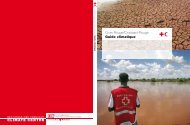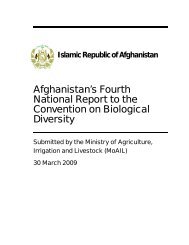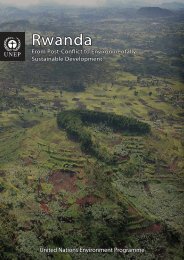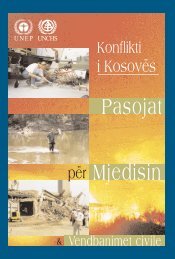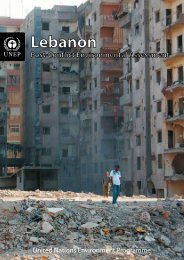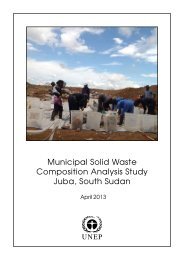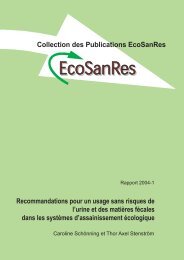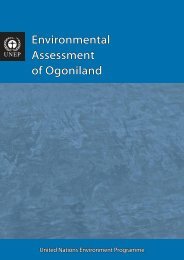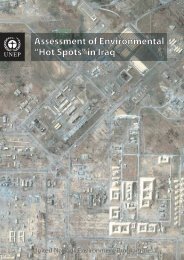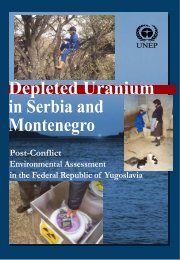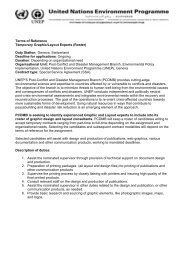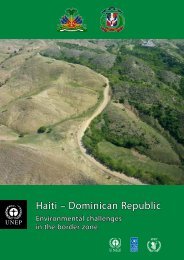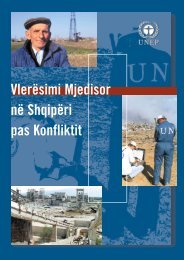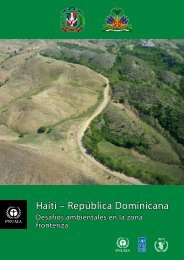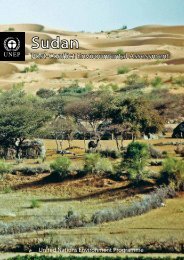Strengthening capacity - Disasters and Conflicts - UNEP
Strengthening capacity - Disasters and Conflicts - UNEP
Strengthening capacity - Disasters and Conflicts - UNEP
Create successful ePaper yourself
Turn your PDF publications into a flip-book with our unique Google optimized e-Paper software.
number of crucial roles – from supporting<br />
economic recovery, through the creation of<br />
livelihoods <strong>and</strong> the resettlement of displaced<br />
populations, to providing opportunities for<br />
dialogue, cooperation, confidence-building, <strong>and</strong><br />
government reform.<br />
The main conclusion of the report is that natural<br />
resources can play different roles throughout the<br />
conflict cycle. Underst<strong>and</strong>ing both the dynamics of<br />
the natural resource in question <strong>and</strong> the specifics of<br />
how it can contribute to the conflict cycle can help<br />
policy-makers <strong>and</strong> practitioners ensure that conflict<br />
prevention <strong>and</strong> conflict-sensitivity are included<br />
within all NRM programmes.<br />
Though each particular crisis or conflict has<br />
a dynamic of its own based on local politics,<br />
economics <strong>and</strong> history, the need for preventative<br />
action is clear. Politicized revenue allocation from<br />
natural resources based around ethnic, religious,<br />
or regional lines has been a major driver of<br />
internal conflict. Similarly, politicized allocation<br />
of water, l<strong>and</strong>, <strong>and</strong> other renewable resources is<br />
constantly driving low level conflict, which can<br />
spark into major violence when linked to ethnic,<br />
national <strong>and</strong> other divisions. Migration away from<br />
environmentally degraded regions can also cause<br />
confrontation within countries <strong>and</strong> across borders.<br />
Even in countries that have not experienced conflict,<br />
the corrupting influence on elites of revenues from<br />
high-value natural resources is a powerful source<br />
of underdevelopment <strong>and</strong> failing economies.<br />
The World Bank estimates that over the last 40<br />
years developing countries without major natural<br />
resources have grown two to three times faster than<br />
those with high resource endowment. 1<br />
Fortunately, there is no lack of operational tools<br />
<strong>and</strong> policy options to address these issues. A wealth<br />
of experience exists on preventing <strong>and</strong> managing<br />
environmental disputes, designing NRM systems,<br />
<strong>and</strong> allocating resource revenues that can be used to<br />
reduce instability risks.<br />
There is a deficit, however, in the application of<br />
these tools, in the development <strong>and</strong> coordination of<br />
conflict prevention strategies, <strong>and</strong> in addressing the<br />
roots of instability during development programmes.<br />
In a world of rising resource scarcity, a reactive <strong>and</strong><br />
piecemeal approach will not preserve security <strong>and</strong><br />
stability. This project <strong>and</strong> set of Guidance Notes aims<br />
to address this gap by increasing awareness, attention<br />
<strong>and</strong> action towards NRM <strong>and</strong> conflict prevention, as<br />
well as providing an inventory of tools <strong>and</strong> examples<br />
that can be drawn upon at the operational level.<br />
1.2 Objectives <strong>and</strong> structure of<br />
this Guidance Note<br />
This is one of four Guidance Notes in a series<br />
entitled, ‘Toolkit <strong>and</strong> Guidance for Preventing <strong>and</strong><br />
Managing L<strong>and</strong> <strong>and</strong> Natural Resources Conflict.’<br />
The other three Guidance Notes address: l<strong>and</strong> <strong>and</strong><br />
conflict; renewable resources <strong>and</strong> conflict, <strong>and</strong> the<br />
Extractive Industries. The Guidance Notes are aimed<br />
at UN <strong>and</strong> EU policy-makers <strong>and</strong> practitioners who<br />
design <strong>and</strong> implement programmes in situations<br />
where environmental drivers are a major cause of, or<br />
contributing factor to, conflict. This Guidance Note<br />
addresses the <strong>capacity</strong>-building component of NRM<br />
i.e. the skills, institutions, practices, <strong>and</strong> relationships<br />
among state <strong>and</strong> civil society actors needed to<br />
effectively manage <strong>and</strong> prevent violent conflicts over<br />
these vital resources.<br />
The other Guidance Notes in this series explore<br />
why l<strong>and</strong>, renewable resources, <strong>and</strong> extractive<br />
resources are often root causes of conflict. Briefly, in<br />
developing states, many people’s lives <strong>and</strong> livelihoods<br />
are dependent on access to l<strong>and</strong>, water, forests, <strong>and</strong><br />
other renewable resources. The sustainable use of<br />
such natural resources require care, ‘adaptiveness’,<br />
<strong>and</strong> participation by many people; in many conflictaffected<br />
states <strong>and</strong> post-conflict states, these abilities<br />
may not be sufficiently developed. Further, a nation<br />
emerging from conflict is likely to be dependent<br />
on natural resources for economic growth <strong>and</strong><br />
prosperity, particularly if high-value extractive<br />
resources are available. When any of these resources<br />
become scarce or degraded, or when claims to them<br />
come into conflict, “peace dividends” disappear <strong>and</strong><br />
other tensions within society may be exacerbated.<br />
The results can be explosive.<br />
STRENGTHENING CAPACITY FOR CONFLICT-<br />
SENSITIVE NATURAL RESOURCE MANAGEMENT 9



